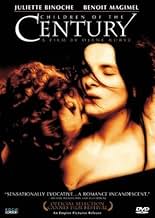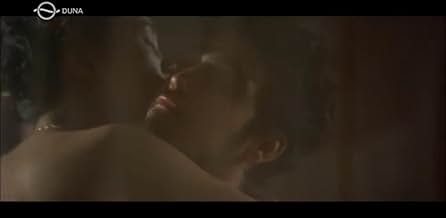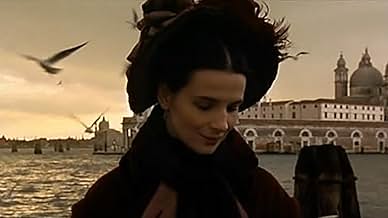Les enfants du siècle
- 1999
- Tous publics
- 2h 15m
IMDb RATING
6.5/10
2.1K
YOUR RATING
A story of doomed passion between two genius writers of the 19th century - novelist George Sand and poet Alfred de Musset.A story of doomed passion between two genius writers of the 19th century - novelist George Sand and poet Alfred de Musset.A story of doomed passion between two genius writers of the 19th century - novelist George Sand and poet Alfred de Musset.
- Director
- Writers
- Stars
Victoire Thivisol
- Solange
- (as Victoire)
- Director
- Writers
- All cast & crew
- Production, box office & more at IMDbPro
Featured reviews
If you have any interest in French Romanticism, or romanticism in general, see this film. The story is taken from both Musset's & Sand's accounts of the affair that took place. If a film is to be made about a poet, use the poets feelings and even words at the most opportune times, this film does that, and then some. This film is well crafted, from every aspect of its making. The performances by Binoche & Magimel are both riveting and heart wrenching.
If this love were a battle, the filmmaker would most definitely taken the side of Sand. As the truth of this affair left Musset's heart dispirited until his death. Even his friends, like Eugene Delacroix, have said that his pen was a poison that infected his reader like a virus. But all histoire aside, as a film, this is an exquisite piece of work, that is both heart-breaking and entertaining. In the words of the central characters, "Shame on you, who are the first to show me treason. The horror and anger, which made me lose my reason."-Alfred de Musset "The angels are no more pure than the heart of a young man who loves truthfully."-George Sand
Above all watch this film and judge for yourself.
If this love were a battle, the filmmaker would most definitely taken the side of Sand. As the truth of this affair left Musset's heart dispirited until his death. Even his friends, like Eugene Delacroix, have said that his pen was a poison that infected his reader like a virus. But all histoire aside, as a film, this is an exquisite piece of work, that is both heart-breaking and entertaining. In the words of the central characters, "Shame on you, who are the first to show me treason. The horror and anger, which made me lose my reason."-Alfred de Musset "The angels are no more pure than the heart of a young man who loves truthfully."-George Sand
Above all watch this film and judge for yourself.
"Enfants du siècle" does'nt really mean "Children of the Century", as for the contemporaries it was obvious that it meant "Heirs of the Napoleonic Saga".
This generation, Hugo, Dumas,, Musset, Nerval, Lamartine and Vigny was obsessed by the sad perception that they could not lead the heroïc, larger than life existence experienced by their fathers during the Revolution and Empire - a period (or shortly thereafter) during which they were born. They - and Aurore Dupin de Francueil (aka George Sand) with them - sought vicariously to find fame and glory in literature, particularly in theatre which was the « 7th art » of those days, and in forms of "original living" which would not surprise those reading now on the antics of 'world famous' people. In those days, that was called « Romantism ».
All of them succeeded in literature; but - even though in those days novels, essays, tales, and poems were keenly read - theatre was the big thing: a kind of Hollywood on Seine! And the successful theatre writers and performers had a fame akin to that of our Hollywood stars of today.
So this film should be seen as the biopic of two larger than life "Hollywood stars".
No surprise that passions, drugs, unfaithfulnesses and manifestations of an enormous ego are sprinkled liberally in this film. One may think of the Burton and Taylor duet, but with a wittier and more intellectual bent.
Musset, fabulously talented, has left immortal poems and several theatre pieces which have been rediscovered in the XXth century and which will last; but he has sadly wasted his talent in alcohol (absinthe mainly), drugs and philandering, prostitutes included; he died at 47.
Sand has been the more resilient of the two. She died at 71, a busy grandmother fond of country life, a true precursor of the cause of women's freedom in terms of choosing her (sometimes Saphic) lovers, espousing political causes, and communing with nature.
Sand's "original" life is her real masterpiece; it has a very modern tone. Her writings are numerous and charming, but for me, the literary genius of the two is Musset: most of his writings are masterpieces, even though his life has been a shambles.
It is no surprise then that Diane Kurys takes Sand as her lead character, against a despondent and weak Musset. And I quite understand why - to some reviewers - they both appear boorish, selfish and inspiring few sympathy. But - keeping in mind that Musset and Sand ooze talent and are their generation's Hollywood superstars - you may enjoy this well crafted biopic.
___ .
This generation, Hugo, Dumas,, Musset, Nerval, Lamartine and Vigny was obsessed by the sad perception that they could not lead the heroïc, larger than life existence experienced by their fathers during the Revolution and Empire - a period (or shortly thereafter) during which they were born. They - and Aurore Dupin de Francueil (aka George Sand) with them - sought vicariously to find fame and glory in literature, particularly in theatre which was the « 7th art » of those days, and in forms of "original living" which would not surprise those reading now on the antics of 'world famous' people. In those days, that was called « Romantism ».
All of them succeeded in literature; but - even though in those days novels, essays, tales, and poems were keenly read - theatre was the big thing: a kind of Hollywood on Seine! And the successful theatre writers and performers had a fame akin to that of our Hollywood stars of today.
So this film should be seen as the biopic of two larger than life "Hollywood stars".
No surprise that passions, drugs, unfaithfulnesses and manifestations of an enormous ego are sprinkled liberally in this film. One may think of the Burton and Taylor duet, but with a wittier and more intellectual bent.
Musset, fabulously talented, has left immortal poems and several theatre pieces which have been rediscovered in the XXth century and which will last; but he has sadly wasted his talent in alcohol (absinthe mainly), drugs and philandering, prostitutes included; he died at 47.
Sand has been the more resilient of the two. She died at 71, a busy grandmother fond of country life, a true precursor of the cause of women's freedom in terms of choosing her (sometimes Saphic) lovers, espousing political causes, and communing with nature.
Sand's "original" life is her real masterpiece; it has a very modern tone. Her writings are numerous and charming, but for me, the literary genius of the two is Musset: most of his writings are masterpieces, even though his life has been a shambles.
It is no surprise then that Diane Kurys takes Sand as her lead character, against a despondent and weak Musset. And I quite understand why - to some reviewers - they both appear boorish, selfish and inspiring few sympathy. But - keeping in mind that Musset and Sand ooze talent and are their generation's Hollywood superstars - you may enjoy this well crafted biopic.
___ .
Diane Kury's oppulent film is a mixed bag. In it's favour it features
real life lovers Juliette Binoche and Benoît Magimel on excellent
form. As Alfred de Musset Magimel gives us a young man
completely out of his mind on a cocktail of opium and absinthe. A
man deeply creative and talented, but unable to function as a
human being. Binoche's George Sand is a strong a determined
woman. The scene where she finds that Musset may die after
overdosing is wonderfully performed with passion and grandeur.
The film comes alive in her eyes. As filmed by Vilko Filac and
dressed by Christian La Croix, Binoche has never looked more
beautiful or sensual.
However Kurys' direction and her screenplay, co-written by
Francois Olivier Rousseau and Murray Head, lacks direction and
understanding of her period. The brothel scenes are particularly
over the top. Yet her direction of her actor is magnificent.
What is missing from Kurys' film most of all however is Sand and
Musset as writers, as creative masters. There is no sense of their
value in the film beyond their doomed love affair.
Les Enfants du Siecle is a mixed bag, but certainly worth a look.
real life lovers Juliette Binoche and Benoît Magimel on excellent
form. As Alfred de Musset Magimel gives us a young man
completely out of his mind on a cocktail of opium and absinthe. A
man deeply creative and talented, but unable to function as a
human being. Binoche's George Sand is a strong a determined
woman. The scene where she finds that Musset may die after
overdosing is wonderfully performed with passion and grandeur.
The film comes alive in her eyes. As filmed by Vilko Filac and
dressed by Christian La Croix, Binoche has never looked more
beautiful or sensual.
However Kurys' direction and her screenplay, co-written by
Francois Olivier Rousseau and Murray Head, lacks direction and
understanding of her period. The brothel scenes are particularly
over the top. Yet her direction of her actor is magnificent.
What is missing from Kurys' film most of all however is Sand and
Musset as writers, as creative masters. There is no sense of their
value in the film beyond their doomed love affair.
Les Enfants du Siecle is a mixed bag, but certainly worth a look.
Contrary to its title, this is not a movie about children in an unnamed century. Instead this movie is about the love/hate relationship between French writers Alfred Musset and George Sand. They are two souls who have a mutual and affectionate understanding of one another until a voyage to Italy reveals their true nature. Passion, envy, trust, betrayal and forgiveness are all brilliantly encompassed in the relationship between Musset and Sand.
I enoyed this movie, though some may find it dull and slow. You may need to be a die-hard romantic or like well-costumed period dramas to watch this movie. My harshest criticism for this film would be that of it's length and even though I enjoyed the turbulent relationship shown in this film, there were times when I thought that their affair had ended for good only for them to reconcile a few scenes later.
This movie is handsomely photographed with wonderful costumes by Christian LaCroix and most magnificent of all, the actors don't seem like they're acting at all. Juliette Binoche is spectacular, both beauitful and natural in her potrayal of Sand. Benoit Magimel is splendid as Alfred Musset. Don't expect historical accuracy, and if you're a romantic at heart, you will not be disappointed.
I enoyed this movie, though some may find it dull and slow. You may need to be a die-hard romantic or like well-costumed period dramas to watch this movie. My harshest criticism for this film would be that of it's length and even though I enjoyed the turbulent relationship shown in this film, there were times when I thought that their affair had ended for good only for them to reconcile a few scenes later.
This movie is handsomely photographed with wonderful costumes by Christian LaCroix and most magnificent of all, the actors don't seem like they're acting at all. Juliette Binoche is spectacular, both beauitful and natural in her potrayal of Sand. Benoit Magimel is splendid as Alfred Musset. Don't expect historical accuracy, and if you're a romantic at heart, you will not be disappointed.
I was really hoping to find some special quality in the two main characters that I could like. However, self absorbed people are usually too melodramatic about every single aspect of their lives and so I had no sympathy for their predicament at all. So, I settled back and enjoyed Julliet Binochet at work. The film was meticulously crafted and the settings and costumes were wonderful, so I got the time machine effect, too. If you like historical melodrama, you might enjoy this.
Did you know
- TriviaGeorge Sand's estate loaned the production some of Sand's jewelry, including a sapphire ring, which Juliette Binoche wears throughout the film.
- Quotes
George Sand: Love does exist, it's not an illusion. One merely has to recognise it, and be humble before it.
- Alternate versionsThe original French theatrical version, which runs at 135 mins begins as Sand plans to leave her husband and Musset's father dies. This version continues after their final meeting as Sand begins to write her story and attempts in vain to see Musset one last time. This version ends with a direct to camera address by Sand at Musset's tomb. A shorter theatrical version was released in Germany, Spain, UK and US which begins with Sand reading from "Lélia" and ends with Sand and Musset's final meeting. It runs at 105 mins. This version contains two new scenes: Sand and Musset being introduced to each other and a dance sequence. However the opening sequences featuring Sands arrival in Paris during an uprising and her relationship with Marie Dorval are lost, as are the closing scenes as she attempts to see Musset a final time. Most DVD releases have favored the Original 135 min version which was more critically popular.
- ConnectionsVersion of La chanson du souvenir (1945)
- How long is Children of the Century?Powered by Alexa
Details
- Release date
- Country of origin
- Official site
- Language
- Also known as
- Children of the Century
- Filming locations
- Production companies
- See more company credits at IMDbPro
Box office
- Gross US & Canada
- $56,611
- Opening weekend US & Canada
- $8,044
- Sep 15, 2002
- Gross worldwide
- $381,624
- Runtime2 hours 15 minutes
- Color
- Sound mix
- Aspect ratio
- 2.35 : 1
Contribute to this page
Suggest an edit or add missing content

































